Corporations Act Case Study: Director's Duties and Lease Agreement
VerifiedAdded on 2021/06/14
|6
|2187
|68
Case Study
AI Summary
This case study examines the legal responsibilities of directors under the Corporations Act 2001, specifically focusing on Fruut Pty Ltd. The analysis addresses whether the directors, Rik, Patel, and Lana, violated section 180(1) regarding their duty of care and diligence. The study explores the application of the business judgment rule (section 180(2)) to Rik's actions in securing a lease and assesses the potential liabilities of all involved parties. Furthermore, the case analyzes the validity of the lease agreement between Rik and Watel Pty Ltd, considering issues of authority and the rule of indoor management. The study concludes that all directors may have violated section 180(1), while Rik might be able to avail the business judgment rule. It also finds that the lease is binding on Fruut Pty Ltd under ostensible authority. The case references relevant legal precedents and statutory provisions to support its findings.
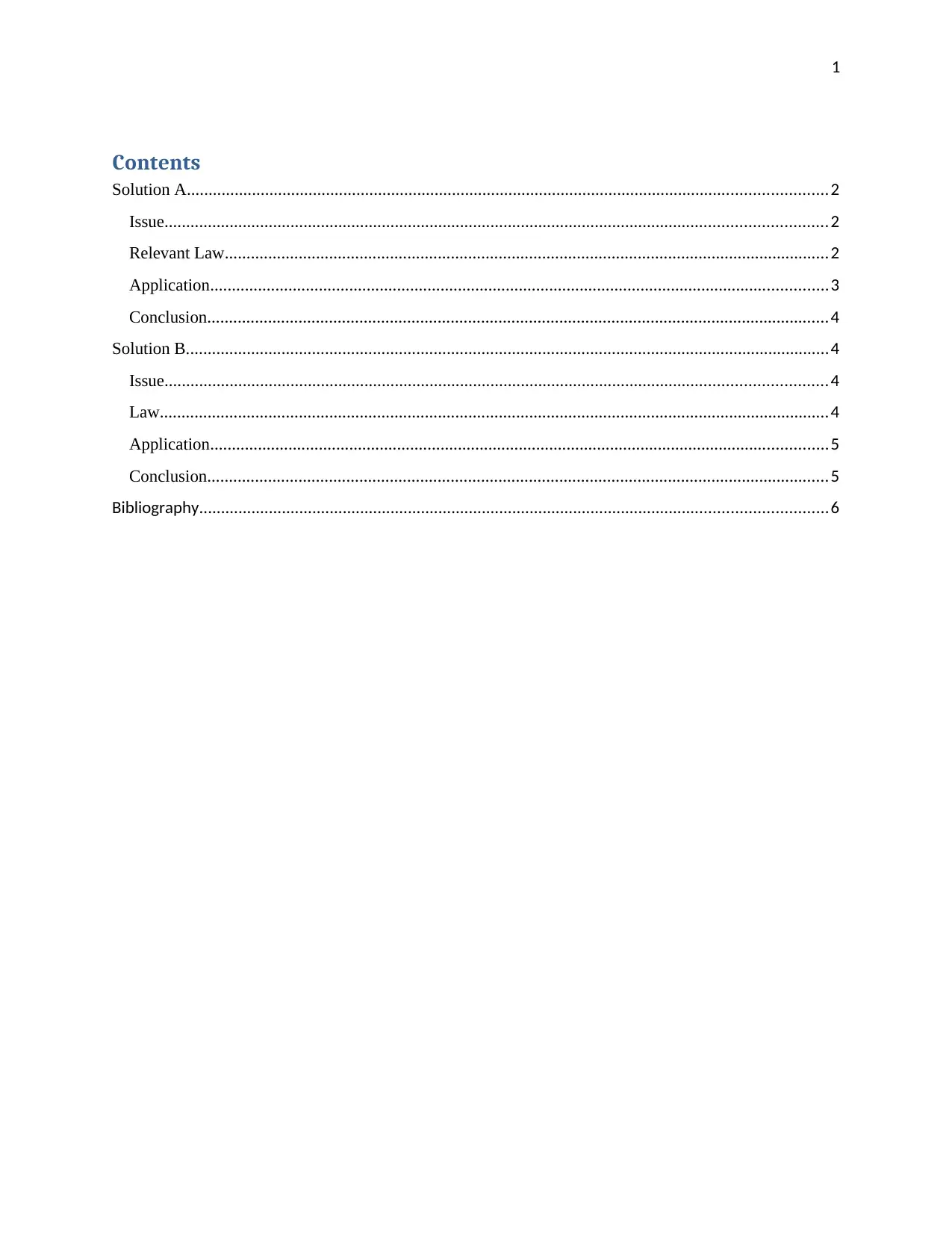
1
Contents
Solution A...................................................................................................................................................2
Issue........................................................................................................................................................2
Relevant Law...........................................................................................................................................2
Application..............................................................................................................................................3
Conclusion...............................................................................................................................................4
Solution B....................................................................................................................................................4
Issue........................................................................................................................................................4
Law..........................................................................................................................................................4
Application..............................................................................................................................................5
Conclusion...............................................................................................................................................5
Bibliography................................................................................................................................................6
Contents
Solution A...................................................................................................................................................2
Issue........................................................................................................................................................2
Relevant Law...........................................................................................................................................2
Application..............................................................................................................................................3
Conclusion...............................................................................................................................................4
Solution B....................................................................................................................................................4
Issue........................................................................................................................................................4
Law..........................................................................................................................................................4
Application..............................................................................................................................................5
Conclusion...............................................................................................................................................5
Bibliography................................................................................................................................................6
Paraphrase This Document
Need a fresh take? Get an instant paraphrase of this document with our AI Paraphraser
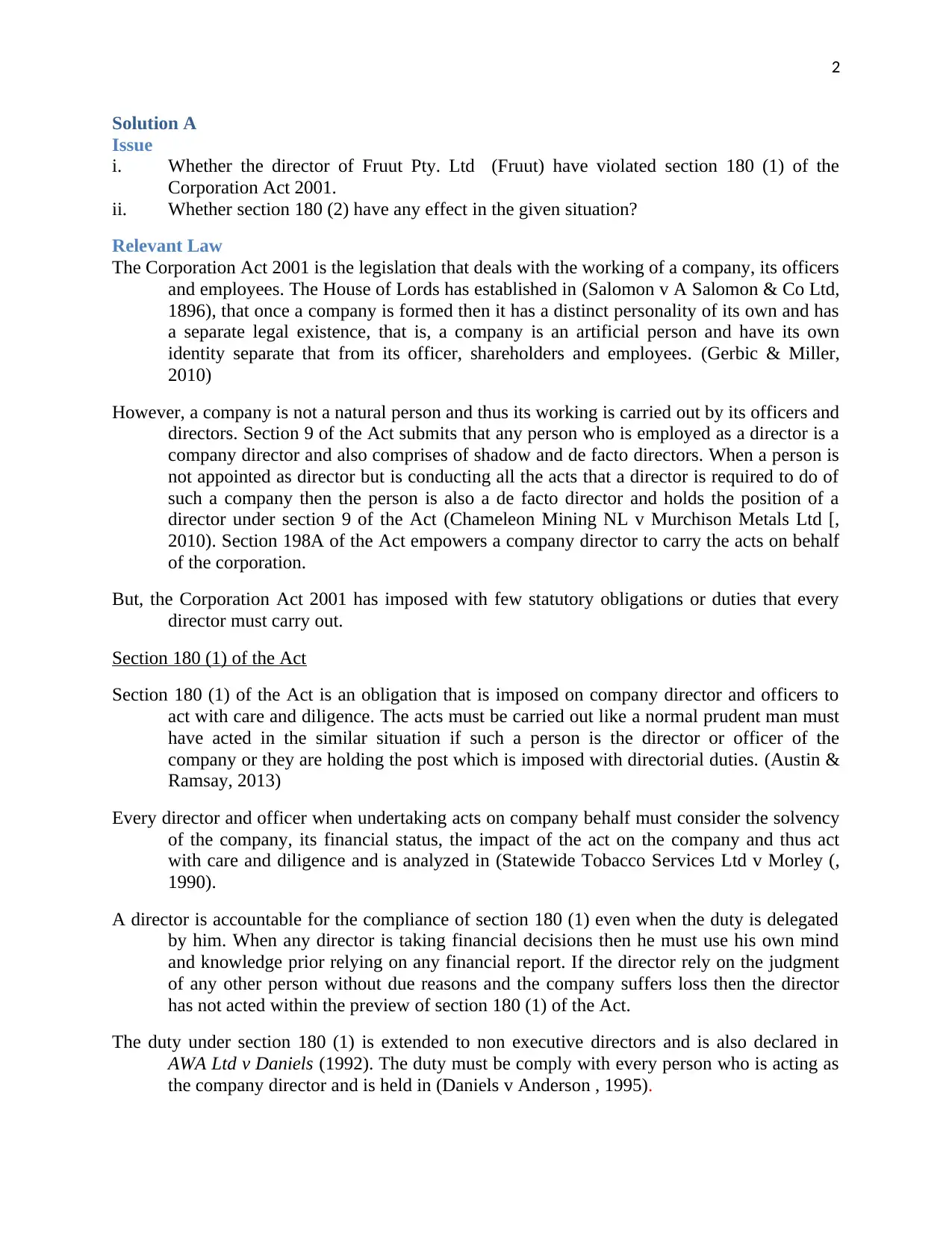
2
Solution A
Issue
i. Whether the director of Fruut Pty. Ltd (Fruut) have violated section 180 (1) of the
Corporation Act 2001.
ii. Whether section 180 (2) have any effect in the given situation?
Relevant Law
The Corporation Act 2001 is the legislation that deals with the working of a company, its officers
and employees. The House of Lords has established in (Salomon v A Salomon & Co Ltd,
1896), that once a company is formed then it has a distinct personality of its own and has
a separate legal existence, that is, a company is an artificial person and have its own
identity separate that from its officer, shareholders and employees. (Gerbic & Miller,
2010)
However, a company is not a natural person and thus its working is carried out by its officers and
directors. Section 9 of the Act submits that any person who is employed as a director is a
company director and also comprises of shadow and de facto directors. When a person is
not appointed as director but is conducting all the acts that a director is required to do of
such a company then the person is also a de facto director and holds the position of a
director under section 9 of the Act (Chameleon Mining NL v Murchison Metals Ltd [,
2010). Section 198A of the Act empowers a company director to carry the acts on behalf
of the corporation.
But, the Corporation Act 2001 has imposed with few statutory obligations or duties that every
director must carry out.
Section 180 (1) of the Act
Section 180 (1) of the Act is an obligation that is imposed on company director and officers to
act with care and diligence. The acts must be carried out like a normal prudent man must
have acted in the similar situation if such a person is the director or officer of the
company or they are holding the post which is imposed with directorial duties. (Austin &
Ramsay, 2013)
Every director and officer when undertaking acts on company behalf must consider the solvency
of the company, its financial status, the impact of the act on the company and thus act
with care and diligence and is analyzed in (Statewide Tobacco Services Ltd v Morley (,
1990).
A director is accountable for the compliance of section 180 (1) even when the duty is delegated
by him. When any director is taking financial decisions then he must use his own mind
and knowledge prior relying on any financial report. If the director rely on the judgment
of any other person without due reasons and the company suffers loss then the director
has not acted within the preview of section 180 (1) of the Act.
The duty under section 180 (1) is extended to non executive directors and is also declared in
AWA Ltd v Daniels (1992). The duty must be comply with every person who is acting as
the company director and is held in (Daniels v Anderson , 1995).
Solution A
Issue
i. Whether the director of Fruut Pty. Ltd (Fruut) have violated section 180 (1) of the
Corporation Act 2001.
ii. Whether section 180 (2) have any effect in the given situation?
Relevant Law
The Corporation Act 2001 is the legislation that deals with the working of a company, its officers
and employees. The House of Lords has established in (Salomon v A Salomon & Co Ltd,
1896), that once a company is formed then it has a distinct personality of its own and has
a separate legal existence, that is, a company is an artificial person and have its own
identity separate that from its officer, shareholders and employees. (Gerbic & Miller,
2010)
However, a company is not a natural person and thus its working is carried out by its officers and
directors. Section 9 of the Act submits that any person who is employed as a director is a
company director and also comprises of shadow and de facto directors. When a person is
not appointed as director but is conducting all the acts that a director is required to do of
such a company then the person is also a de facto director and holds the position of a
director under section 9 of the Act (Chameleon Mining NL v Murchison Metals Ltd [,
2010). Section 198A of the Act empowers a company director to carry the acts on behalf
of the corporation.
But, the Corporation Act 2001 has imposed with few statutory obligations or duties that every
director must carry out.
Section 180 (1) of the Act
Section 180 (1) of the Act is an obligation that is imposed on company director and officers to
act with care and diligence. The acts must be carried out like a normal prudent man must
have acted in the similar situation if such a person is the director or officer of the
company or they are holding the post which is imposed with directorial duties. (Austin &
Ramsay, 2013)
Every director and officer when undertaking acts on company behalf must consider the solvency
of the company, its financial status, the impact of the act on the company and thus act
with care and diligence and is analyzed in (Statewide Tobacco Services Ltd v Morley (,
1990).
A director is accountable for the compliance of section 180 (1) even when the duty is delegated
by him. When any director is taking financial decisions then he must use his own mind
and knowledge prior relying on any financial report. If the director rely on the judgment
of any other person without due reasons and the company suffers loss then the director
has not acted within the preview of section 180 (1) of the Act.
The duty under section 180 (1) is extended to non executive directors and is also declared in
AWA Ltd v Daniels (1992). The duty must be comply with every person who is acting as
the company director and is held in (Daniels v Anderson , 1995).
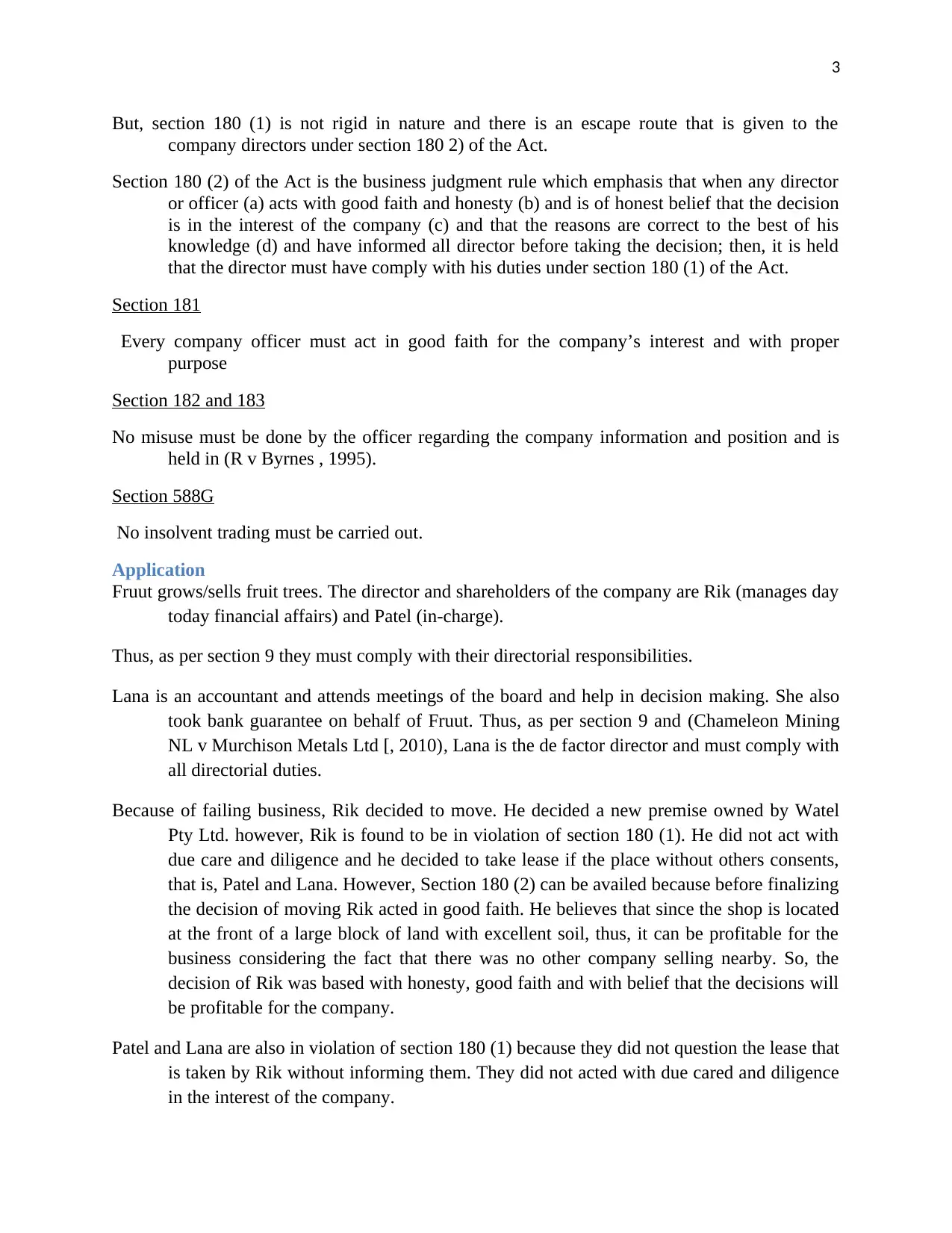
3
But, section 180 (1) is not rigid in nature and there is an escape route that is given to the
company directors under section 180 2) of the Act.
Section 180 (2) of the Act is the business judgment rule which emphasis that when any director
or officer (a) acts with good faith and honesty (b) and is of honest belief that the decision
is in the interest of the company (c) and that the reasons are correct to the best of his
knowledge (d) and have informed all director before taking the decision; then, it is held
that the director must have comply with his duties under section 180 (1) of the Act.
Section 181
Every company officer must act in good faith for the company’s interest and with proper
purpose
Section 182 and 183
No misuse must be done by the officer regarding the company information and position and is
held in (R v Byrnes , 1995).
Section 588G
No insolvent trading must be carried out.
Application
Fruut grows/sells fruit trees. The director and shareholders of the company are Rik (manages day
today financial affairs) and Patel (in-charge).
Thus, as per section 9 they must comply with their directorial responsibilities.
Lana is an accountant and attends meetings of the board and help in decision making. She also
took bank guarantee on behalf of Fruut. Thus, as per section 9 and (Chameleon Mining
NL v Murchison Metals Ltd [, 2010), Lana is the de factor director and must comply with
all directorial duties.
Because of failing business, Rik decided to move. He decided a new premise owned by Watel
Pty Ltd. however, Rik is found to be in violation of section 180 (1). He did not act with
due care and diligence and he decided to take lease if the place without others consents,
that is, Patel and Lana. However, Section 180 (2) can be availed because before finalizing
the decision of moving Rik acted in good faith. He believes that since the shop is located
at the front of a large block of land with excellent soil, thus, it can be profitable for the
business considering the fact that there was no other company selling nearby. So, the
decision of Rik was based with honesty, good faith and with belief that the decisions will
be profitable for the company.
Patel and Lana are also in violation of section 180 (1) because they did not question the lease that
is taken by Rik without informing them. They did not acted with due cared and diligence
in the interest of the company.
But, section 180 (1) is not rigid in nature and there is an escape route that is given to the
company directors under section 180 2) of the Act.
Section 180 (2) of the Act is the business judgment rule which emphasis that when any director
or officer (a) acts with good faith and honesty (b) and is of honest belief that the decision
is in the interest of the company (c) and that the reasons are correct to the best of his
knowledge (d) and have informed all director before taking the decision; then, it is held
that the director must have comply with his duties under section 180 (1) of the Act.
Section 181
Every company officer must act in good faith for the company’s interest and with proper
purpose
Section 182 and 183
No misuse must be done by the officer regarding the company information and position and is
held in (R v Byrnes , 1995).
Section 588G
No insolvent trading must be carried out.
Application
Fruut grows/sells fruit trees. The director and shareholders of the company are Rik (manages day
today financial affairs) and Patel (in-charge).
Thus, as per section 9 they must comply with their directorial responsibilities.
Lana is an accountant and attends meetings of the board and help in decision making. She also
took bank guarantee on behalf of Fruut. Thus, as per section 9 and (Chameleon Mining
NL v Murchison Metals Ltd [, 2010), Lana is the de factor director and must comply with
all directorial duties.
Because of failing business, Rik decided to move. He decided a new premise owned by Watel
Pty Ltd. however, Rik is found to be in violation of section 180 (1). He did not act with
due care and diligence and he decided to take lease if the place without others consents,
that is, Patel and Lana. However, Section 180 (2) can be availed because before finalizing
the decision of moving Rik acted in good faith. He believes that since the shop is located
at the front of a large block of land with excellent soil, thus, it can be profitable for the
business considering the fact that there was no other company selling nearby. So, the
decision of Rik was based with honesty, good faith and with belief that the decisions will
be profitable for the company.
Patel and Lana are also in violation of section 180 (1) because they did not question the lease that
is taken by Rik without informing them. They did not acted with due cared and diligence
in the interest of the company.
⊘ This is a preview!⊘
Do you want full access?
Subscribe today to unlock all pages.

Trusted by 1+ million students worldwide
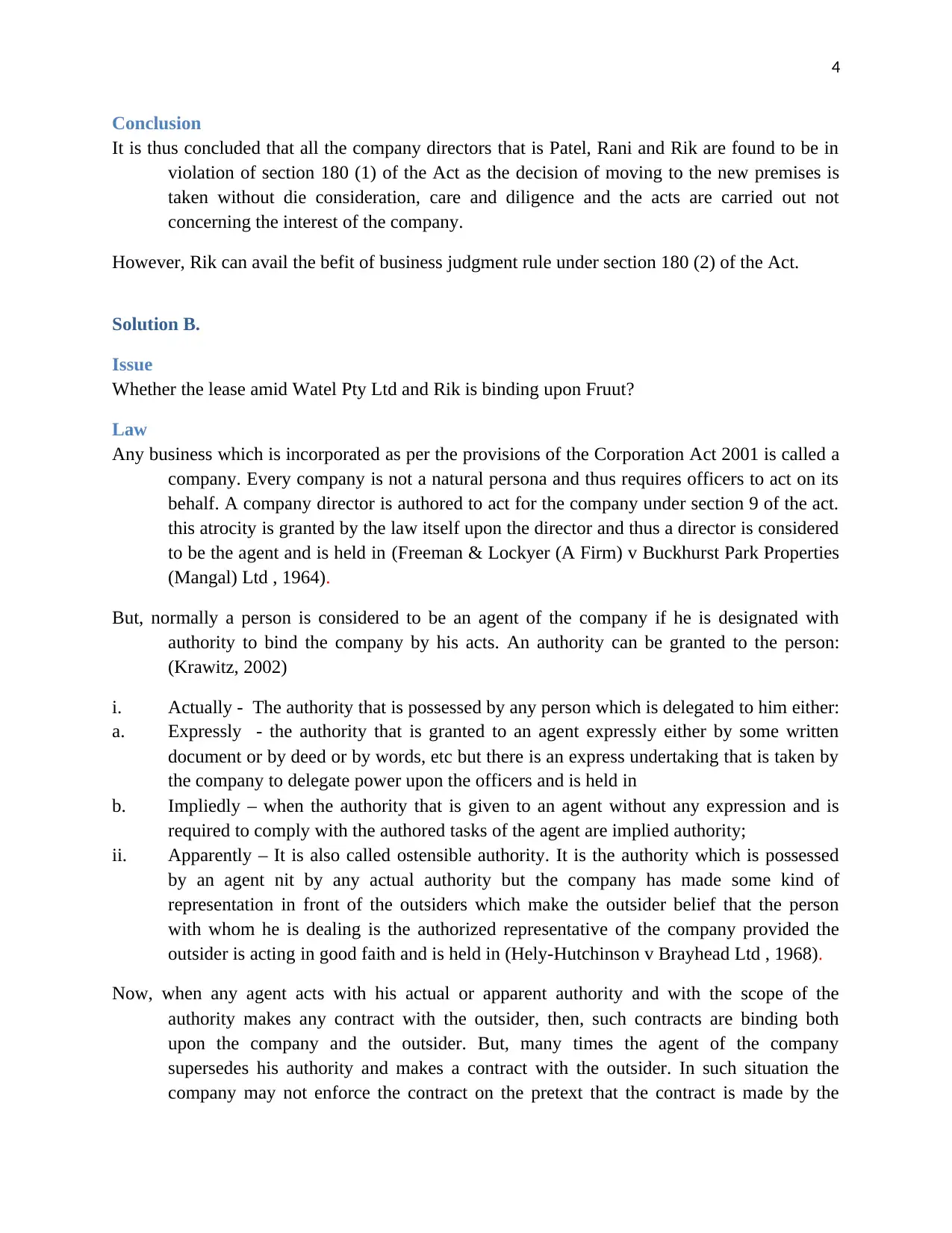
4
Conclusion
It is thus concluded that all the company directors that is Patel, Rani and Rik are found to be in
violation of section 180 (1) of the Act as the decision of moving to the new premises is
taken without die consideration, care and diligence and the acts are carried out not
concerning the interest of the company.
However, Rik can avail the befit of business judgment rule under section 180 (2) of the Act.
Solution B.
Issue
Whether the lease amid Watel Pty Ltd and Rik is binding upon Fruut?
Law
Any business which is incorporated as per the provisions of the Corporation Act 2001 is called a
company. Every company is not a natural persona and thus requires officers to act on its
behalf. A company director is authored to act for the company under section 9 of the act.
this atrocity is granted by the law itself upon the director and thus a director is considered
to be the agent and is held in (Freeman & Lockyer (A Firm) v Buckhurst Park Properties
(Mangal) Ltd , 1964).
But, normally a person is considered to be an agent of the company if he is designated with
authority to bind the company by his acts. An authority can be granted to the person:
(Krawitz, 2002)
i. Actually - The authority that is possessed by any person which is delegated to him either:
a. Expressly - the authority that is granted to an agent expressly either by some written
document or by deed or by words, etc but there is an express undertaking that is taken by
the company to delegate power upon the officers and is held in
b. Impliedly – when the authority that is given to an agent without any expression and is
required to comply with the authored tasks of the agent are implied authority;
ii. Apparently – It is also called ostensible authority. It is the authority which is possessed
by an agent nit by any actual authority but the company has made some kind of
representation in front of the outsiders which make the outsider belief that the person
with whom he is dealing is the authorized representative of the company provided the
outsider is acting in good faith and is held in (Hely-Hutchinson v Brayhead Ltd , 1968).
Now, when any agent acts with his actual or apparent authority and with the scope of the
authority makes any contract with the outsider, then, such contracts are binding both
upon the company and the outsider. But, many times the agent of the company
supersedes his authority and makes a contract with the outsider. In such situation the
company may not enforce the contract on the pretext that the contract is made by the
Conclusion
It is thus concluded that all the company directors that is Patel, Rani and Rik are found to be in
violation of section 180 (1) of the Act as the decision of moving to the new premises is
taken without die consideration, care and diligence and the acts are carried out not
concerning the interest of the company.
However, Rik can avail the befit of business judgment rule under section 180 (2) of the Act.
Solution B.
Issue
Whether the lease amid Watel Pty Ltd and Rik is binding upon Fruut?
Law
Any business which is incorporated as per the provisions of the Corporation Act 2001 is called a
company. Every company is not a natural persona and thus requires officers to act on its
behalf. A company director is authored to act for the company under section 9 of the act.
this atrocity is granted by the law itself upon the director and thus a director is considered
to be the agent and is held in (Freeman & Lockyer (A Firm) v Buckhurst Park Properties
(Mangal) Ltd , 1964).
But, normally a person is considered to be an agent of the company if he is designated with
authority to bind the company by his acts. An authority can be granted to the person:
(Krawitz, 2002)
i. Actually - The authority that is possessed by any person which is delegated to him either:
a. Expressly - the authority that is granted to an agent expressly either by some written
document or by deed or by words, etc but there is an express undertaking that is taken by
the company to delegate power upon the officers and is held in
b. Impliedly – when the authority that is given to an agent without any expression and is
required to comply with the authored tasks of the agent are implied authority;
ii. Apparently – It is also called ostensible authority. It is the authority which is possessed
by an agent nit by any actual authority but the company has made some kind of
representation in front of the outsiders which make the outsider belief that the person
with whom he is dealing is the authorized representative of the company provided the
outsider is acting in good faith and is held in (Hely-Hutchinson v Brayhead Ltd , 1968).
Now, when any agent acts with his actual or apparent authority and with the scope of the
authority makes any contract with the outsider, then, such contracts are binding both
upon the company and the outsider. But, many times the agent of the company
supersedes his authority and makes a contract with the outsider. In such situation the
company may not enforce the contract on the pretext that the contract is made by the
Paraphrase This Document
Need a fresh take? Get an instant paraphrase of this document with our AI Paraphraser
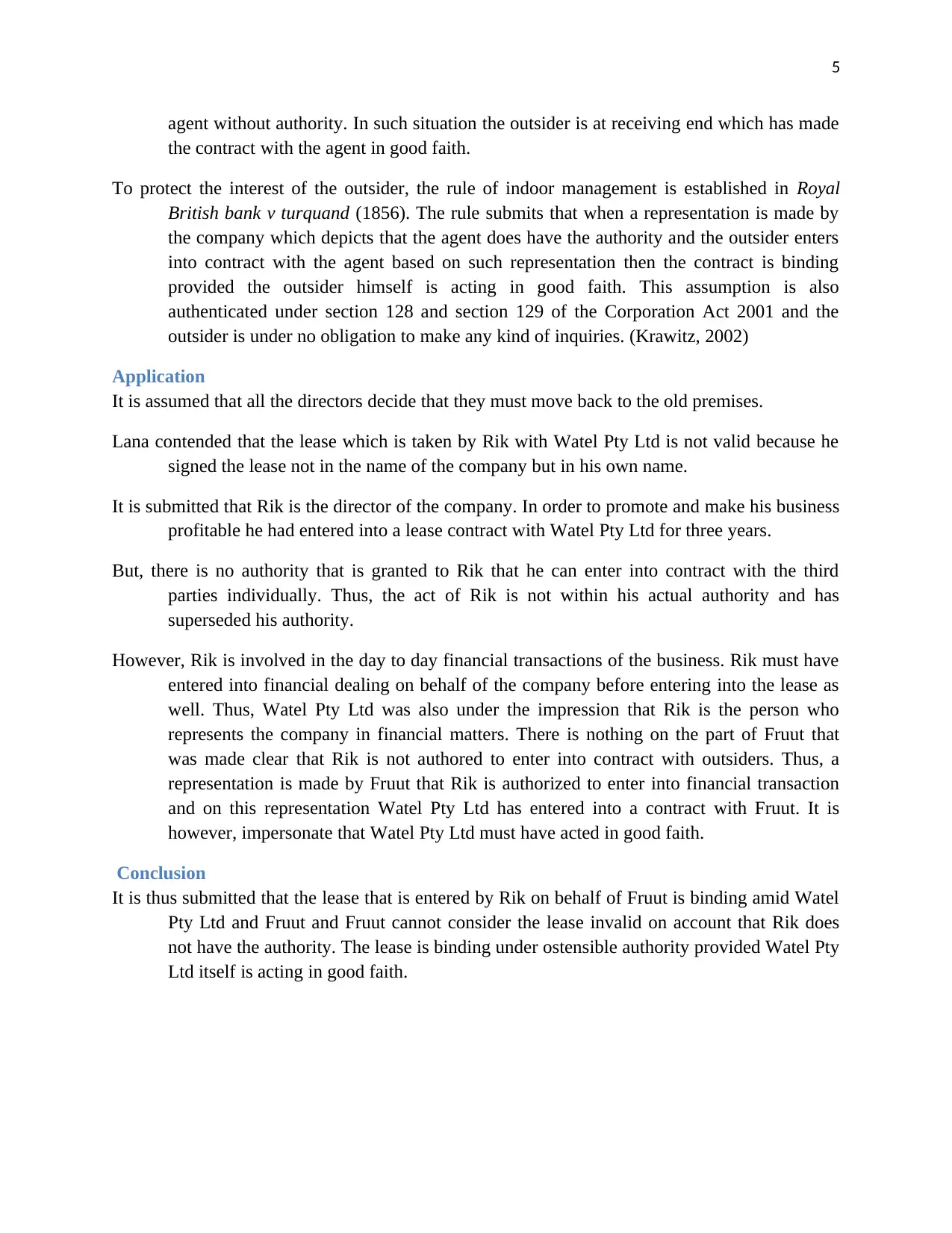
5
agent without authority. In such situation the outsider is at receiving end which has made
the contract with the agent in good faith.
To protect the interest of the outsider, the rule of indoor management is established in Royal
British bank v turquand (1856). The rule submits that when a representation is made by
the company which depicts that the agent does have the authority and the outsider enters
into contract with the agent based on such representation then the contract is binding
provided the outsider himself is acting in good faith. This assumption is also
authenticated under section 128 and section 129 of the Corporation Act 2001 and the
outsider is under no obligation to make any kind of inquiries. (Krawitz, 2002)
Application
It is assumed that all the directors decide that they must move back to the old premises.
Lana contended that the lease which is taken by Rik with Watel Pty Ltd is not valid because he
signed the lease not in the name of the company but in his own name.
It is submitted that Rik is the director of the company. In order to promote and make his business
profitable he had entered into a lease contract with Watel Pty Ltd for three years.
But, there is no authority that is granted to Rik that he can enter into contract with the third
parties individually. Thus, the act of Rik is not within his actual authority and has
superseded his authority.
However, Rik is involved in the day to day financial transactions of the business. Rik must have
entered into financial dealing on behalf of the company before entering into the lease as
well. Thus, Watel Pty Ltd was also under the impression that Rik is the person who
represents the company in financial matters. There is nothing on the part of Fruut that
was made clear that Rik is not authored to enter into contract with outsiders. Thus, a
representation is made by Fruut that Rik is authorized to enter into financial transaction
and on this representation Watel Pty Ltd has entered into a contract with Fruut. It is
however, impersonate that Watel Pty Ltd must have acted in good faith.
Conclusion
It is thus submitted that the lease that is entered by Rik on behalf of Fruut is binding amid Watel
Pty Ltd and Fruut and Fruut cannot consider the lease invalid on account that Rik does
not have the authority. The lease is binding under ostensible authority provided Watel Pty
Ltd itself is acting in good faith.
agent without authority. In such situation the outsider is at receiving end which has made
the contract with the agent in good faith.
To protect the interest of the outsider, the rule of indoor management is established in Royal
British bank v turquand (1856). The rule submits that when a representation is made by
the company which depicts that the agent does have the authority and the outsider enters
into contract with the agent based on such representation then the contract is binding
provided the outsider himself is acting in good faith. This assumption is also
authenticated under section 128 and section 129 of the Corporation Act 2001 and the
outsider is under no obligation to make any kind of inquiries. (Krawitz, 2002)
Application
It is assumed that all the directors decide that they must move back to the old premises.
Lana contended that the lease which is taken by Rik with Watel Pty Ltd is not valid because he
signed the lease not in the name of the company but in his own name.
It is submitted that Rik is the director of the company. In order to promote and make his business
profitable he had entered into a lease contract with Watel Pty Ltd for three years.
But, there is no authority that is granted to Rik that he can enter into contract with the third
parties individually. Thus, the act of Rik is not within his actual authority and has
superseded his authority.
However, Rik is involved in the day to day financial transactions of the business. Rik must have
entered into financial dealing on behalf of the company before entering into the lease as
well. Thus, Watel Pty Ltd was also under the impression that Rik is the person who
represents the company in financial matters. There is nothing on the part of Fruut that
was made clear that Rik is not authored to enter into contract with outsiders. Thus, a
representation is made by Fruut that Rik is authorized to enter into financial transaction
and on this representation Watel Pty Ltd has entered into a contract with Fruut. It is
however, impersonate that Watel Pty Ltd must have acted in good faith.
Conclusion
It is thus submitted that the lease that is entered by Rik on behalf of Fruut is binding amid Watel
Pty Ltd and Fruut and Fruut cannot consider the lease invalid on account that Rik does
not have the authority. The lease is binding under ostensible authority provided Watel Pty
Ltd itself is acting in good faith.
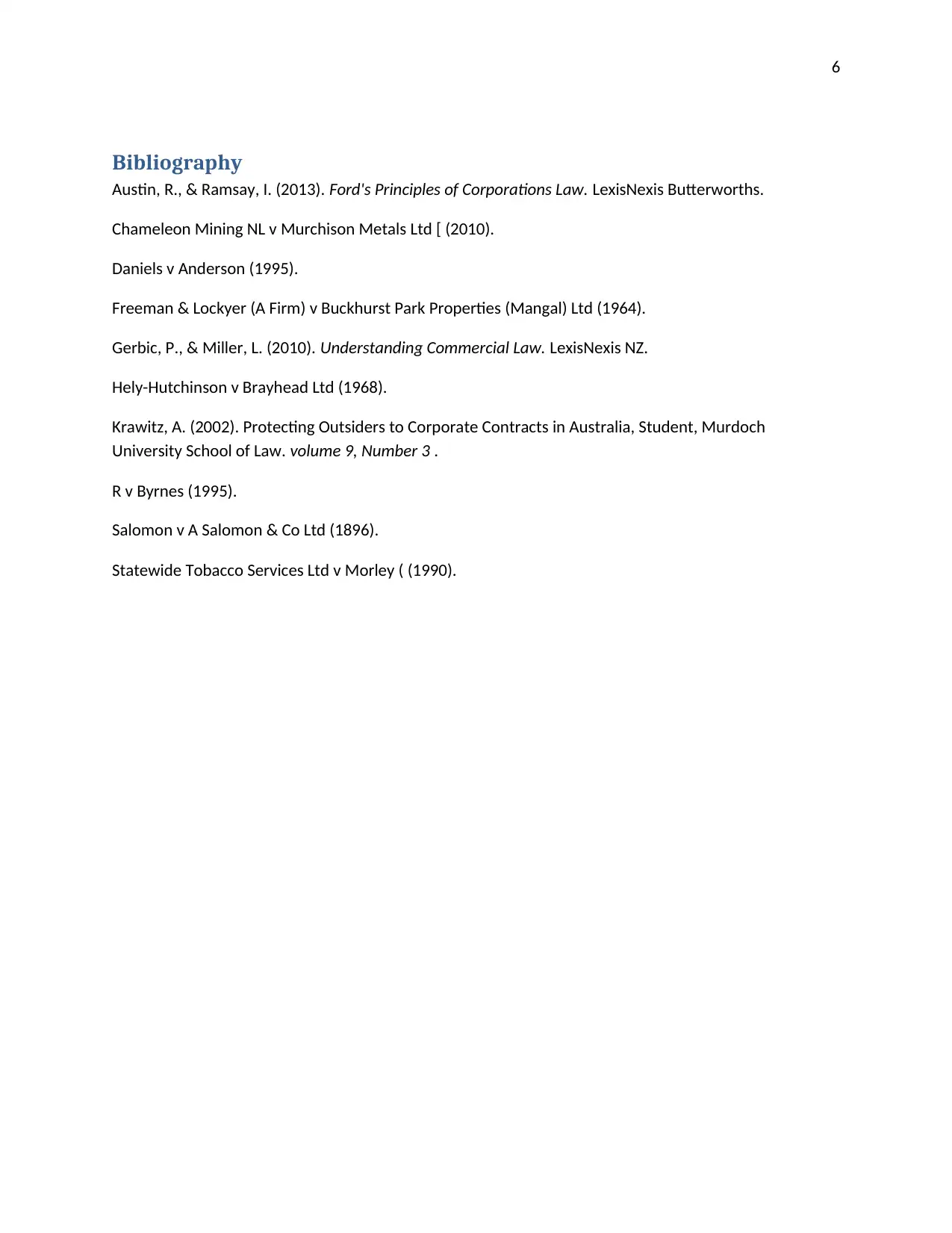
6
Bibliography
Austin, R., & Ramsay, I. (2013). Ford's Principles of Corporations Law. LexisNexis Butterworths.
Chameleon Mining NL v Murchison Metals Ltd [ (2010).
Daniels v Anderson (1995).
Freeman & Lockyer (A Firm) v Buckhurst Park Properties (Mangal) Ltd (1964).
Gerbic, P., & Miller, L. (2010). Understanding Commercial Law. LexisNexis NZ.
Hely-Hutchinson v Brayhead Ltd (1968).
Krawitz, A. (2002). Protecting Outsiders to Corporate Contracts in Australia, Student, Murdoch
University School of Law. volume 9, Number 3 .
R v Byrnes (1995).
Salomon v A Salomon & Co Ltd (1896).
Statewide Tobacco Services Ltd v Morley ( (1990).
Bibliography
Austin, R., & Ramsay, I. (2013). Ford's Principles of Corporations Law. LexisNexis Butterworths.
Chameleon Mining NL v Murchison Metals Ltd [ (2010).
Daniels v Anderson (1995).
Freeman & Lockyer (A Firm) v Buckhurst Park Properties (Mangal) Ltd (1964).
Gerbic, P., & Miller, L. (2010). Understanding Commercial Law. LexisNexis NZ.
Hely-Hutchinson v Brayhead Ltd (1968).
Krawitz, A. (2002). Protecting Outsiders to Corporate Contracts in Australia, Student, Murdoch
University School of Law. volume 9, Number 3 .
R v Byrnes (1995).
Salomon v A Salomon & Co Ltd (1896).
Statewide Tobacco Services Ltd v Morley ( (1990).
⊘ This is a preview!⊘
Do you want full access?
Subscribe today to unlock all pages.

Trusted by 1+ million students worldwide
1 out of 6
Related Documents
Your All-in-One AI-Powered Toolkit for Academic Success.
+13062052269
info@desklib.com
Available 24*7 on WhatsApp / Email
![[object Object]](/_next/static/media/star-bottom.7253800d.svg)
Unlock your academic potential
Copyright © 2020–2026 A2Z Services. All Rights Reserved. Developed and managed by ZUCOL.





